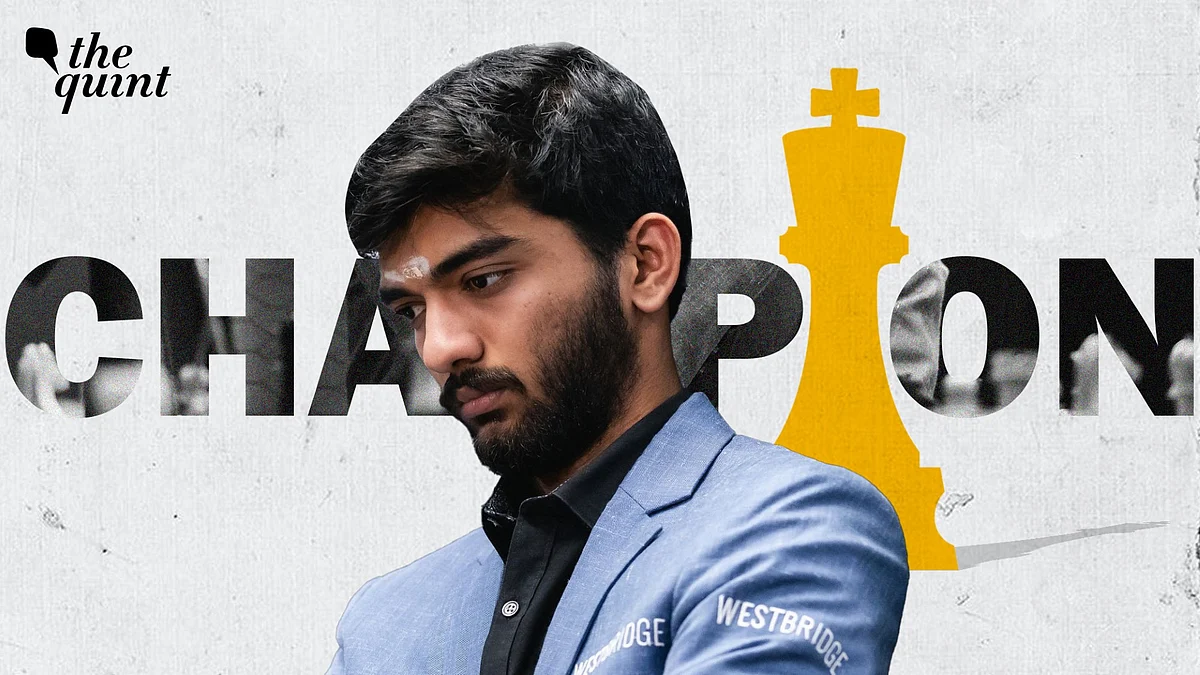
How World Champion Gukesh Won the Irresistible Force vs Immovable Object Contest
The finer details of 18-year-old D Gukesh's incredible triumph over Ding Liren.

advertisement
The age bar was set lower by a mile at the Chess World Championship in Singapore, when Dommaraju Gukesh became the youngest champion, beating the current World champion Ding Liren of China. It was not merely days or months, but four years by which he decimated a mark set by Magnus Carlsen and Garry Kasparov, and it looks like almost a permanent record because we cannot imagine another 18-year-old 'scaling the Everest and crossing the Amazon of chess’, to borrow an expression that former World champion Viswanathan Anand used when he lost to Anatoly Karpov in the final in Lucerne 16 years ago.
You may get 10-year-old Grandmasters in future to make chess younger, but to go through the grind of the World Championship in a tell-tale fashion and end the 14-game journey in style requires incredible talent and motivation. By the way, eighteen is not just his age, but he is also the 18th World champion.
The Gukesh Masterplan – A Robust Team
The notable feature of Gukesh’s work ethic has been that he was able to bring in a sizably big team to assist him during his preparation and also during the match. Grzegorz Gajewski, Radoslaw Wojtaszek, Pentala Harikrishna, Vincent Keymer and most significantly, a man ‘who does not understand chess that much’ (quote by Gukesh), Paddy Upton – his mental and physical trainer. Upton was in the news sometime back when he helped the Indian cricket team prepare for its World Cup training.
In fact, the big revelation was the kind of planning that went into Gukesh’s pre-match preparation. After the match, Harikrishna joined the commentary team to tell how and where he, Radoslaw and Vincent Keymer worked together in Spain (near Mallorca) before the match and also during it.
Gukesh had a long training session in Spain with his team before coming to Singapore and the team, sans Gajewski, stayed back to help him considering the time difference between the venue (Singapore) and the training place. That would help them prepare long in the evenings in the European zone when Gukesh was sleeping. Moreover, the chess world in Singapore will not have any idea about who is all there in Gukesh’s team.
Let’s Not Forget Vishy Anand (& God), Shall We?
Vishy Anand’s contribution to Gukesh’s preparation is also laudable though he was not part of the new world champion’s team. Gajewski and Radoslaw were Vishy’s contributions to Gukesh in training. His academy WACA also helped Gukesh prior to his Candidates tournament and systematic training. However, Harikrishna’s role is interesting. He was second to Yu Wenjun, the current world champion during her match against Lei Tingjei, another Chinese. In his own words, “I helped a Chinese beat another Chinese then and now an Indian defeat a Chinese.”
It will be a travesty of justice if we ignore Gukesh’s thanksgiving comment. “God gave me many opportunities right from a Chennai tournament to Candidates and now,” he said. And God’s hand (like Maradona’s) was no less strong in the last game that seemed headed for the tie-break.
The Finer Details
Gukesh has been living a dream for the last twelve months. First, there was a GM tournament that he won to qualify for the Candidates. And then in the Candidates he won dramatically to become the youngest Challenger in the history of chess. To cap it, this last-round game in Singapore ended in just a moment after move 55 when Ding Liren decided to exchange the rooks, which resulted in a King and pawn ending. Two versus one pawn structure in that position was lost and all the efforts that Liren took to take the match to tie-breaker came to nought in that fatal moment.
Perhaps, the one mistake that Liren made was his intent on going into the tie-breaker which had favoured him when he beat Ian Nepomniachtchi to become the World champion two years ago.
The Irresistible Force, That Is Dommaraju Gukesh
To sum up, it should be said that Gukesh’s opening preparation was perfect to the tee. In almost every game, he put Liren under tremendous time pressure because of fresh ideas in the first 10 moves. Of course, he missed some good continuations but Liren had spent all the time sitting like a monk, defending and defending.
Chess historians will probably bill this match as a new irresistible force versus immovable object spectacle, much like they did the Boris Spassky vs Tigran Petrosian duel for the title almost sixty years ago. ‘Iron’ Tigran was the equivalent of stubborn defence like Liren and the irresistible force in Singapore was Dommaraju Gukesh.
- Access to all paywalled content on site
- Ad-free experience across The Quint
- Early previews of our Special Projects
Published: undefined